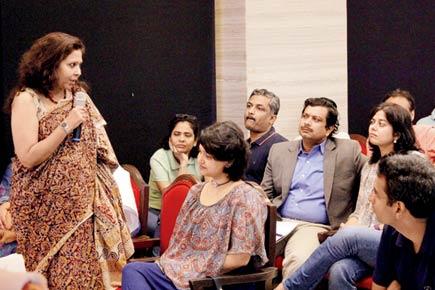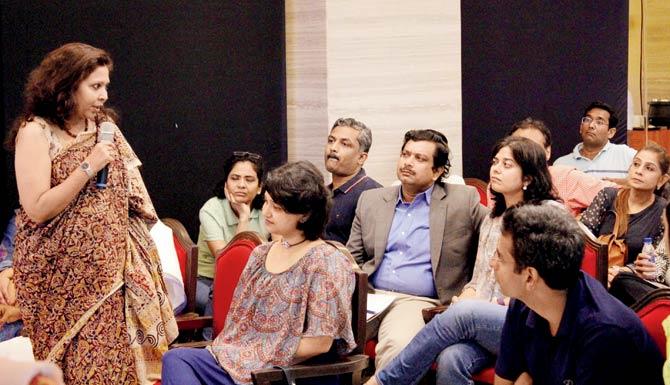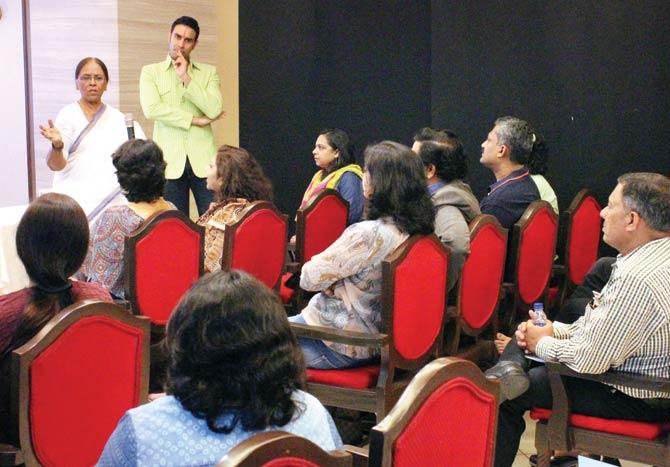This past weekend saw 50 adoptive parents who sat in rapt attention at an adoption workshop held at a banquet hall in Worli, under the aegis of the NGO Catalysts for Social Action (CSA)

This past weekend saw 50 adoptive parents who sat in rapt attention at an adoption workshop held at a banquet hall in Worli, under the aegis of the Non Governmental Organization (NGO) Catalysts for Social Action (CSA), an organization that works for improving the adoption scenario in the country.
ADVERTISEMENT

Shibani Jain answers a few questions
Explaining why the workshop was held, Sidney Rocha, CSA CEO, said, “We saw a gap between the adoption process and the know how once the child has been adopted. New adoption laws mean we cannot help people adopt children, as the process is now online and centralised, but we are doing our bit to guide them on the process.”

Bharati Das Gupta shares her experience. Pics/Fatima Tehniyat
Vipul Jain, co-founder and president, CSA, who himself is an adoptive parent said, “My wife Shibani and I started CSA in 2002, after we learnt of the adoption statistics in India. Per year, only 5,000 children were adopted. We decided to do our bit to raise the numbers and help parents adopt children. We have learnt so much over the years, and this is one way we can help answer questions adoptive parents have.”
Bharati Das Gupta, one of the co-founders and trustees of CSA is an adoptive grand parent and was the person who was instrumental in organising the workshop. She said, “Every parent is responsible for how the child shapes up and all problems that a child faces, are not due to adoption. There are many myths and I felt there was a need for a workshop like this to address and dispel those.”
The first session was taken by Madhuri Abhyankar, director of Samarpan Programme for Adoption Research, Counselling and Consultancy (SPARCC) who works in the field of adoption and Deepali Kumta, social service coordinator at SPARCC who is also an adoptive parent. They told the parents that at different stages, they need to share with their adopted child that he or she is adopted, as sharing is an important component of the process.
Ruhi L, a Peddar Road resident who has an adopted daughter under five years-old said, “There are times when neighbours ask embarrassing questions. I think, if I tell her she may not take it well. I feel it is better to hide it. When she is old enough, I will tell her.”
Abhyankar and Kumta disagreed with this approach and asked her to use stories, and videos to initiate the process of telling her child. “You need to be positive of the child’s birth parents. Make it natural and do not say anything negative. The child needs reassurance to accept that she is adopted. It is better to say that a child is lost and found rather than abandoned.”
Kumta added, “The key person to tell the child about adoption is the parent. It is better you tell him, rather than they finding out from other sources, which will shatter them. The truth will relieve you and your child will accept it much better than you can ever imagine.”
Many adoptive parents felt adopted children suffered from more learning disabilities than those that are not, but Mazrat Khan, counsellor and Rukshana Sholapurwala, special educator dispelled that fear, saying there is no data to support that. Many of the adoptive parents were relieved to learn that adoption and learning disabilities do not have a link.
Raman V, Vashi resident who recently adopted a baby boy said, “I am happy that I could hear these speakers. I am much more confident about being a good parent, now.” Samantha D Bandra resident, said she felt the same way. The key takeaway though was that it was upto the parent to tell the child that he/she was adopted, not anybody else.
 Subscribe today by clicking the link and stay updated with the latest news!" Click here!
Subscribe today by clicking the link and stay updated with the latest news!" Click here!






